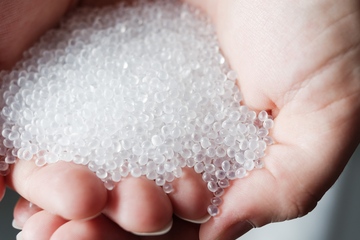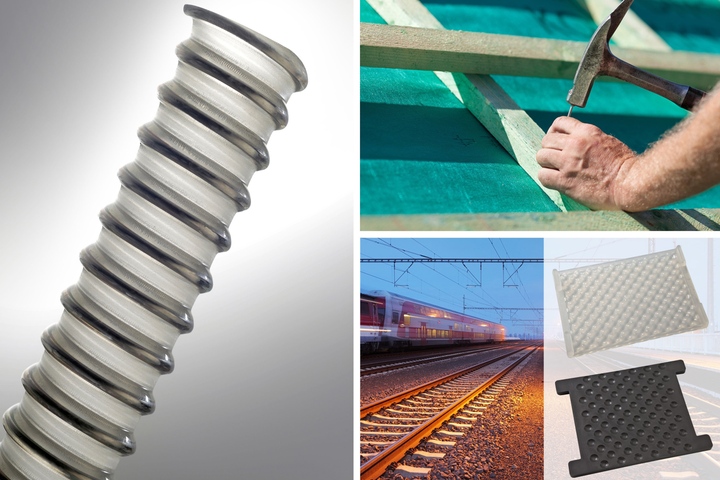BASF
PA 6, TPU grades with low-carbon footprint / Ultramid ZeroPCF to achieve net-zero greenhouse gas emissions
— By Plasteurope.com correspondent —
German petrochemicals group BASF (Ludwigshafen; www.basf.com) has expanded its sustainable product offerings with low-carbon footprint grades in polyamide 6 and ether-based thermoplastic polyurethane (TPU).
German petrochemicals group BASF (Ludwigshafen; www.basf.com) has expanded its sustainable product offerings with low-carbon footprint grades in polyamide 6 and ether-based thermoplastic polyurethane (TPU).
 The new Ultramid grade is manufactured using renewable raw materials (Photo: BASF) |
The company has introduced new low and no product carbon footprint (PCF) grades into its Ultramid polyamide portfolio in Europe. The Ultramid LowPCF grades are manufactured using electricity from renewable sources, while certified biomethane replaces natural gas to produce low-emissions steam, a spokesperson said.
Related: German government to fund ‘world’s most powerful’ industrial heat pump at Ludwigshafen / Carbon-free steam
BASF went on to explain that the generation of PCF from raw material extraction to the factory gate is reduced by at least 30% compared with conventional products. The company is offering its Ultramid B brand, the precursor caprolactam, and its Ultramid C in LowPCF options.
The new Ultramid ZeroPCF grade, which BASF says is the first in the industry to achieve net-zero greenhouse gas emissions, is manufactured using renewable raw materials according to a mass-balance approach.
The ISCC Plus-certified Ultramid ZeroPCF grades replace fossil raw materials with a corresponding amount of certified biomethane and bio-naphtha at the beginning of the production process. Ultramid ZeroPCF also takes into account the biogenic uptake, or the amount of CO₂ absorbed from the atmosphere during the growth and lifetime of the material, the company said.
In addition, BASF has launched Elastollan 1400, a new TPU series that provides exceptional hydrolysis resistance and microbe resistance, combining stable processing behaviour with good compression set values. The new series offers excellent mechanical properties making it particularly suitable for the transportation and industrial manufacturing industries, and even footwear, BASF said.
Related: German government to fund ‘world’s most powerful’ industrial heat pump at Ludwigshafen / Carbon-free steam
BASF went on to explain that the generation of PCF from raw material extraction to the factory gate is reduced by at least 30% compared with conventional products. The company is offering its Ultramid B brand, the precursor caprolactam, and its Ultramid C in LowPCF options.
The new Ultramid ZeroPCF grade, which BASF says is the first in the industry to achieve net-zero greenhouse gas emissions, is manufactured using renewable raw materials according to a mass-balance approach.
The ISCC Plus-certified Ultramid ZeroPCF grades replace fossil raw materials with a corresponding amount of certified biomethane and bio-naphtha at the beginning of the production process. Ultramid ZeroPCF also takes into account the biogenic uptake, or the amount of CO₂ absorbed from the atmosphere during the growth and lifetime of the material, the company said.
In addition, BASF has launched Elastollan 1400, a new TPU series that provides exceptional hydrolysis resistance and microbe resistance, combining stable processing behaviour with good compression set values. The new series offers excellent mechanical properties making it particularly suitable for the transportation and industrial manufacturing industries, and even footwear, BASF said.
 Applications for the new ether-based thermoplastic PU series include cable sheathings, tubes and hoses, gear wheels, and shoe soles (Photo: BASF) |
The company further explained that the dynamic properties of the series – resulting from a discrete glass transition temperature and an extended viscoelastic plateau – enhance dimensional stability and enable a broad thermal application range.
The Elastollan 1400 series was designed to offer a lower carbon footprint than TPU grades with a comparable performance. For example, an Elastollan 1400 TPU with 80 Shore A hardness can reduce the carbon footprint by up to 30%, the company said.
30.10.2024 Plasteurope.com [256394-0]
Published on 30.10.2024
